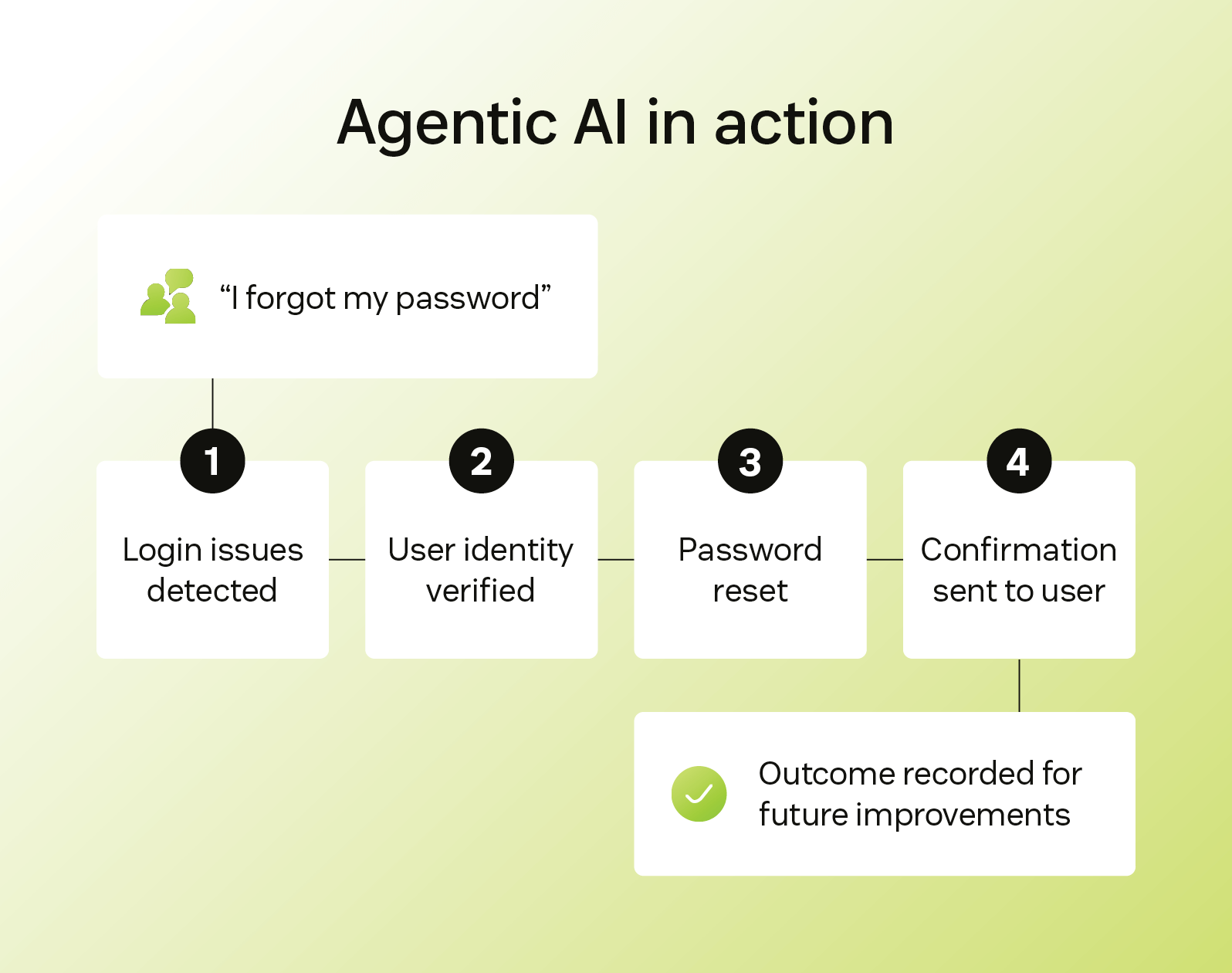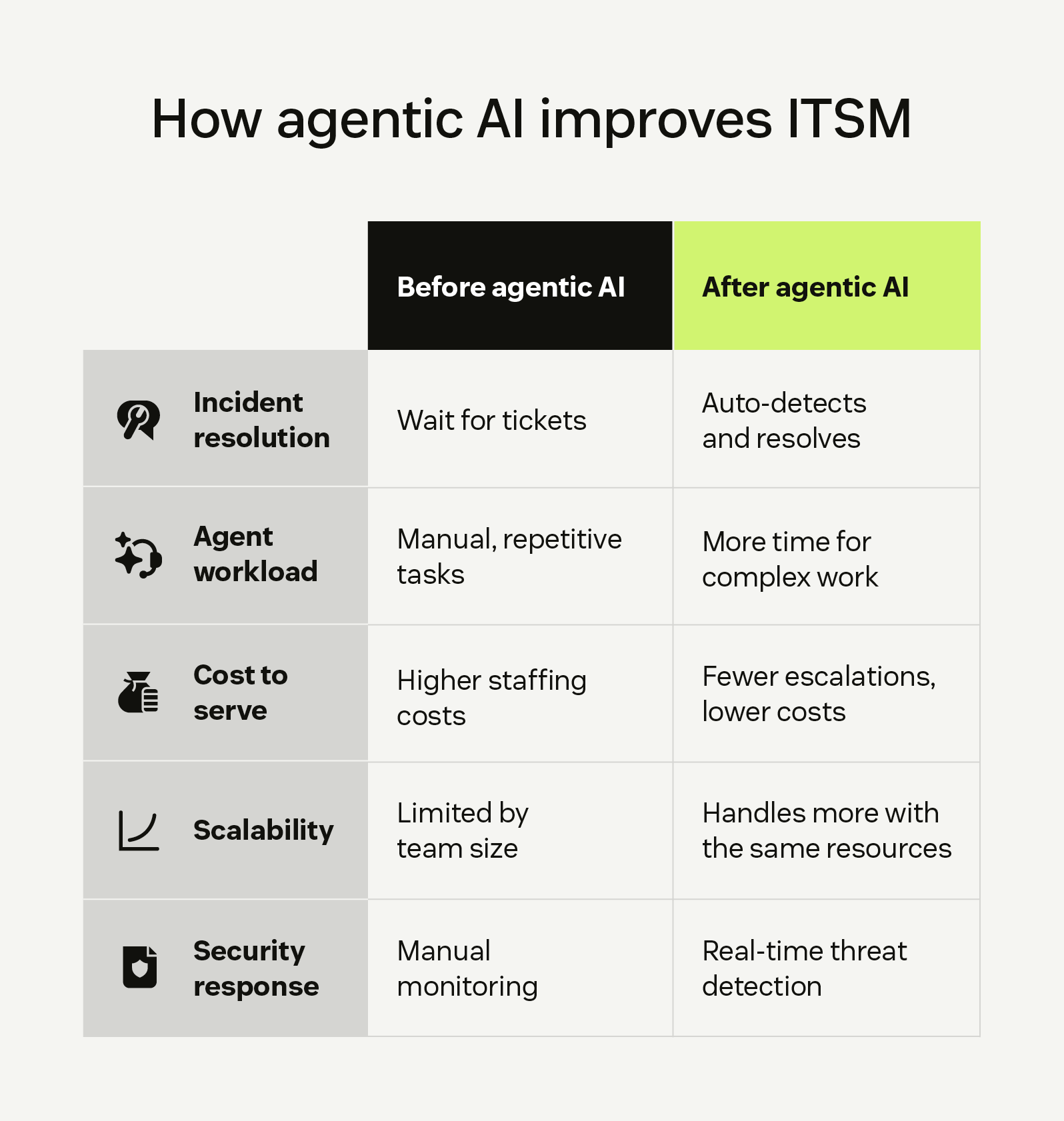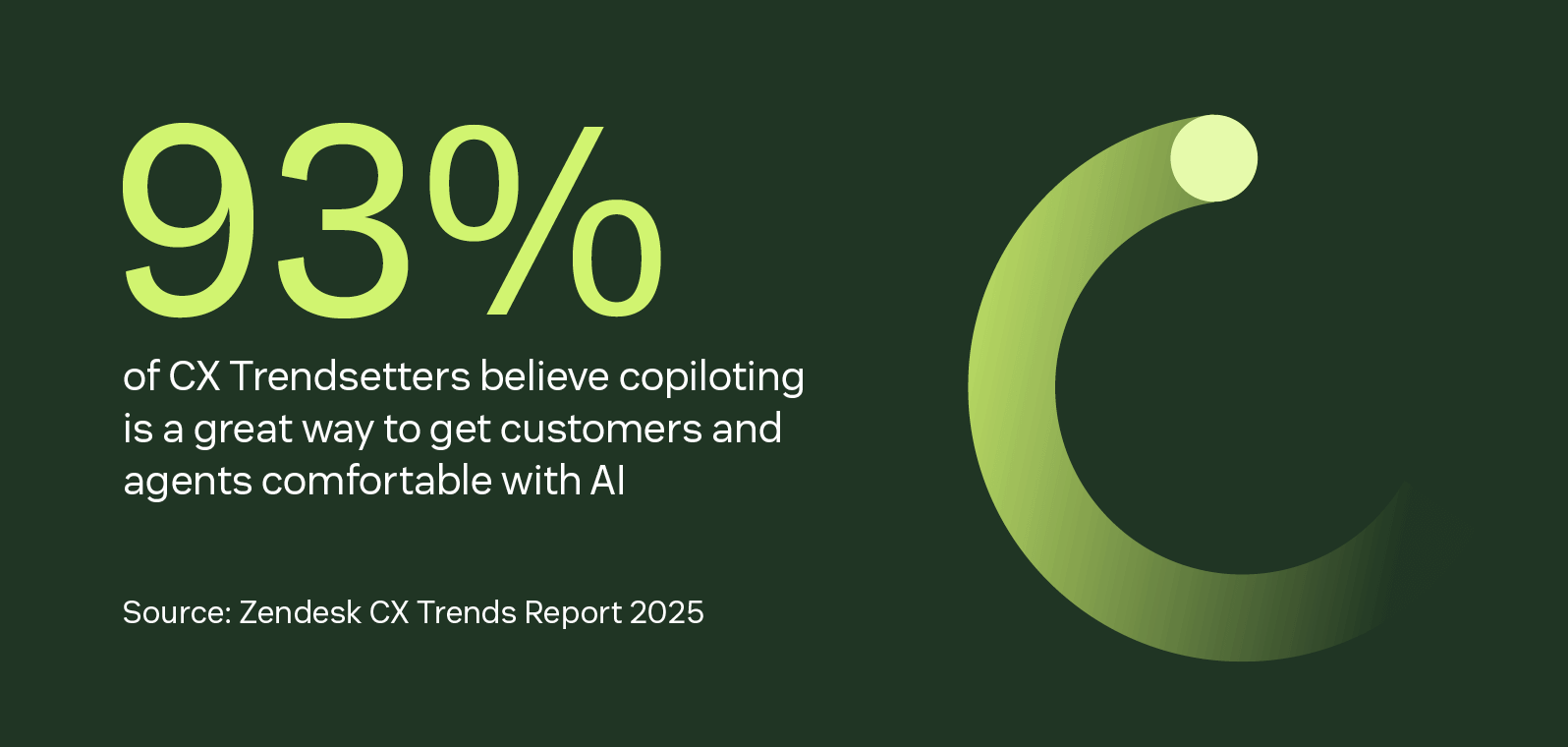Article • 5 min read
Agentic AI in ITSM: The future of IT service management
When teams implement AI agents into their ITSM processes, they’re more efficient, proactive, and focused. Learn more about how AI is changing ITSM below.
Candace Marshall
Vice President, Product Marketing, AI and Automation
최종 업데이트: September 19, 2025
What is agentic AI in ITSM?Agentic AI in ITSM refers to the use of autonomous AI agents to manage IT services. These advanced agents can independently handle tasks, enhance efficiency, and provide proactive support, freeing up IT teams to focus on more important tasks. |
Behind every software update and password reset is IT service management (ITSM), quietly toiling away to keep business operations running.
But with 75 percent of organizations reporting that remote and hybrid work models have intensified IT operational challenges, the demands on IT teams are rising exponentially. As a result, many organizations are turning to agentic AI in ITSM to deliver more resilient and efficient service.
This marks a new era of ITSM, one defined by autonomous AI that empowers teams to deliver high-quality service at scale. Below, we’ll break down how agentic AI works and why it’s poised to transform service delivery.
More in this guide:
- Agentic vs. generative vs. traditional AI
- How does agentic AI work?
- Benefits of agentic AI in ITSM
- Use cases of agentic AI in ITSM
- Embrace agentic AI in ITSM with Zendesk
Agentic vs. generative vs. traditional AI
Traditional AI uses rule-based systems to complete narrowly defined tasks. This helps automate tasks like routing tickets or sorting requests, where the logic is consistent and outcomes are predictable. These types of repetitive workflows have long been the foundation of AI in customer experience.
Generative AI came into the picture more recently, with tools like ChatGPT leading the charge. This technology allows users to create entirely new content using natural language and represents a major leap forward from the limits of rule-based systems. However, its main limitation is that it can’t act independently.
Now, agentic AI is emerging as the next frontier. These systems go beyond other AI models in their ability to act autonomously. Rather than just suggesting a solution, agentic AI can carry it out by taking action across systems and making real-time decisions. And the best part is, it learns from outcomes to keep improving over time.
How does agentic AI work?
Agentic AI combines technologies like machine learning (ML), large language models (LLMs), and natural language processing (NLP) to do far more than just generate content or follow rules. It can understand complex requests, analyze real-time context, make decisions, and take action independently.
Here’s how agentic AI typically works:
- Perception: Gathers data from different sources and uses NLP to interpret the request
- Reasoning: Analyzes the information to identify the goal and determine the best course of action
- Execution: Initiates multi-step workflows across systems, without waiting for human input
- Learns and adapts: Refines future decisions based on feedback and outcomes
Building on these capabilities, agentic AI connects with external tools like ticketing systems, identity management platforms, and collaboration tools. This allows it to take action across multiple platforms without human input, reducing delays and manual effort.

Benefits of agentic AI in ITSM
IT service management (ITSM) plays a critical role in maintaining the reliability and performance of the technology businesses rely on daily. Because many ITSM tasks are complex and time-sensitive, they benefit significantly from the speed and autonomy of agentic AI.
Some of the specific benefits of agentic AI in ITSM include:
- Faster incident resolution: Automating multi-step workflows and time-consuming processes helps resolve issues faster and eases the workload on IT teams.
- Reduced costs: By automating repetitive and time-consuming tasks, agentic AI helps reduce errors and workload costs.
- Greater scalability: Agentic AI can handle a high volume of requests, helping teams maintain performance during peak times without burnout.
- Improved security: These systems continuously monitor for threats, operate within pre-defined security policies, and escalate suspicious activity to human teams when needed.
Essentially, agentic AI is part of a broader shift in how IT teams operate, shifting their focus from manual upkeep to higher-impact work. To stay competitive, businesses need to embrace agentic AI as a leading ITSM trend shaping the future of service management.

Use cases of agentic AI in ITSM
More organizations are adopting agentic AI in ITSM and Enterprise Service Management (ESM), which applies ITSM principles across other departments. Because it can handle high volumes of tasks and adapt to changing conditions, agentic AI is particularly valuable in these environments.
Here are specific use cases showing how agentic AI improves ITSM operations.
AI agents to autonomously resolve inquiries and incidents
Agentic AI helps IT service desk teams save time by automatically resolving incidents as they happen. Let’s say your work printer stops working. An AI agent doesn’t need to wait for someone to file a ticket; instead, it can detect the disruption, diagnose the problem, and take corrective action independently.
Zendesk AI agents are purpose-built for this kind of automation. With a resolution-first approach, they can be deployed instantly with zero training and can handle up to 80 percent of common support interactions without human intervention. IT teams can also set clear parameters around what the AI agents are allowed to do, giving them the efficiency benefits of automation while minimizing risk.
Automated problem identification for spotting issues before they compound
One of the most impressive capabilities of agentic AI is its ability to continuously detect patterns across systems. This allows it to flag potential issues before they escalate into bigger problems.
For instance, if employees across different locations start experiencing Wi-Fi issues, agentic AI can spot the pattern, pinpoint the source, and alert IT before the issue spreads further. Addressing problems early like this allows IT teams to maintain service stability and avoid unnecessary disruptions.
AI-driven cybersecurity for safeguarding employee and customer data
Agentic AI’s constant system monitoring enables it to detect potential threats and respond promptly. When it recognizes suspicious patterns, such as unusual login behavior or unauthorized attempts to access sensitive data, it can respond immediately to minimize risk. This autonomous protection keeps organizations ahead of evolving threats and reduces dependence on manual monitoring.
For example, Zendesk combines agentic AI with built-in compliance and security capabilities, helping organizations safeguard sensitive employee and customer data while adhering to internal policies and industry standards.
AI copilot to support IT teams and support agents
An AI copilot complements agentic AI by helping human agents step into a supervisory role. It assists with tasks like surfacing relevant information, summarizing past interactions, and automating repetitive tasks like password resets or system checks.
Instead of manually handling every step, agents can oversee and guide these workflows, maintaining control while ensuring compliance with internal processes. This leads to faster resolutions and more consistent support without compromising oversight.

AI-powered knowledge bases and self-service resources for independent resolutions
AI-powered knowledge bases supply accurate information that agentic AI uses to diagnose issues and choose the right actions. By understanding natural language and user intent, these systems improve IT service desk efficiency by reducing repetitive requests and giving employees faster access to solutions on their own terms.
Zendesk leverages AI to take knowledge bases further, offering AI-driven suggestions that recommend relevant articles in real time. Plus, its generative AI tools simplify building and maintaining a knowledge base, helping employees find answers independently.
AI-powered change management for driving effective changes
Change management in ITSM involves planning and implementing updates to IT systems, like software updates or new service rollouts. Agentic AI improves this process by assessing risk factors, recommending optimal timing, and helping teams follow well-defined workflows.
One way agentic AI enhances change management is through AI copilots that actively assist IT teams throughout each stage of a change. This reduces the chance of human error and leads to smoother changes with less disruption.
Proactive management of all ITSM services
Teams can also leverage agentic AI to improve service processes and user experiences across the entire ITSM ecosystem. Monitoring everything from ticket volumes to system performance can help identify inefficiencies. This oversight helps IT teams spot patterns and make informed adjustments that keep services reliable, even as demands and systems evolve.
Customer story


Fred IT Group
Fred IT Group enjoys easy migration plus 360-degree customer views
“We were looking for something that would take us into the future with best-of-breed tools, and Zendesk fits what we were looking for more than anything else.”
Kerri McLellan
General Manager of Customer Experience
Embrace agentic AI in ITSM with Zendesk
ITSM may have once been the quiet engine keeping business operations running, but with agentic AI, it’s becoming a proactive force for innovation. As AI systems take on more responsibility, teams that embrace this new era will be better equipped to scale their impact across the business.
Zendesk for employee service makes this shift easier with AI solutions designed to prioritize the overall employee experience. It’s ready on day one, built to scale, and trained on billions of support interactions—so your employees get fast, accurate help when they need it most.
